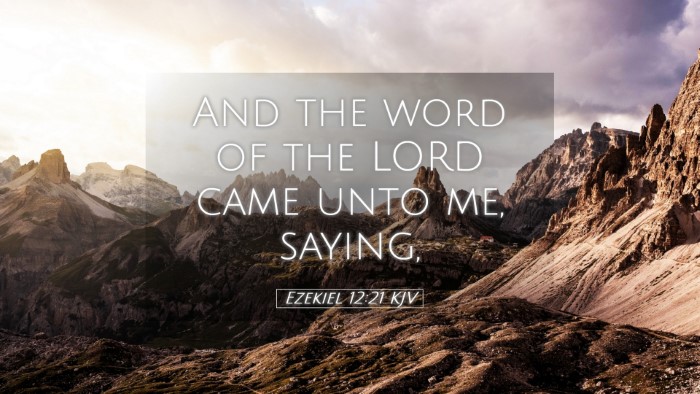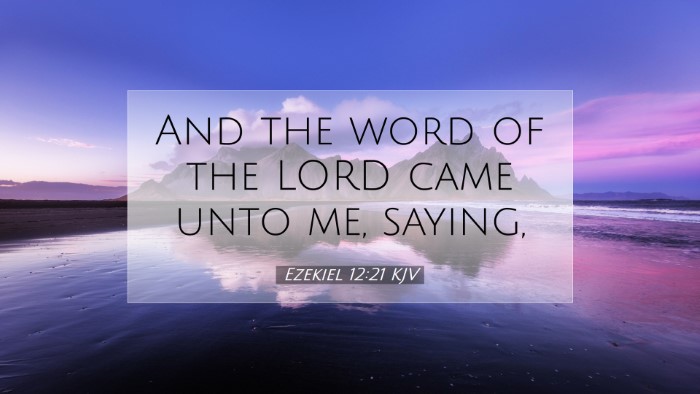Ezekiel 12:21 Commentary
Ezekiel 12:21 states:
"And the word of the Lord came unto me, saying," continuing with a powerful message that reflects
on the themes of prophecy, judgment, and the nature of God’s communication with His people.
Contextual Introduction
The context of Ezekiel's prophecy is significant. The prophet speaks during a time of turmoil for Israel,
specifically during the Babylonian exile. His role as a prophet involves not only foretelling future events
but also providing insights into the present condition and spiritual state of the people.
Interpretation of the Verse
This phrase reveals the ongoing dialogue between God and His prophet. The repeat mention of God speaking
underscores the urgency and divine origin of the message that follows. The nature of God's word is dynamic;
it is both a warning and an invitation to reflect and repent.
Insights from Matthew Henry
According to Matthew Henry, this verse highlights the accountability of a prophet. He notes that Ezekiel's
role was to ensure the people understood their circumstances and the gravity of their situation:
- Prophetic Responsibility: Henry emphasizes that prophets are called to deliver God's
messages faithfully, regardless of the people's response. This reflects the unwavering commitment
of God to communicate His will to His chosen instruments.
- Divine Communication: The phrase "the word of the Lord came unto me" illustrates
the mode by which God interacts with His servants. It is direct and personal, signifying a special
relationship between the Divine and the prophet.
Insights from Albert Barnes
Albert Barnes provides a more theological perspective, interpreting this verse as a demonstration of
God's sovereignty and omniscience. He writes:
- God's Sovereignty: Barnes highlights that even in exile, God is still speaking and
guiding His people. The continuity of God's communication serves as a reminder that He is in control,
even during times of hardship.
- Judgment and Mercy: Barnes also elaborates on the dual themes of judgment and mercy.
While God's warnings often indicate impending judgment, they are also an opportunity for repentance
and restoration.
Insights from Adam Clarke
Adam Clarke offers a more pastoral reflection on Ezekiel 12:21. He underscores the importance of
listening for God's voice amid chaos:
- Listening to God's Voice: Clarke encourages believers to cultivate an ear for God's
word, recognizing that He continues to speak today through Scripture, prayer, and circumstances.
- Relevance of Prophecy: In Clarke's view, the relevance of Ezekiel's prophecy
extends beyond his time. The insistence of God speaking to the prophet reflects a continuous call
for vigilance and faithfulness among God's people throughout generations.
Theological Themes
The conversation between God and Ezekiel forms several theological themes relevant for pastoral and
scholarly reflection:
- Divine Revelation: Understanding how God reveals Himself through prophets and how
this revelation should be treated with reverence.
- Human Response: The necessity for humans to respond to God's word with humility
and obedience, a theme prevalent throughout prophetic literature.
- Hope Amid Despair: Even in declension, there is hope found in God's willingness
to communicate and offer guidance, pointing toward a future restoration.
Practical Applications
For pastors, students, and scholars, the insights from Ezekiel 12:21 can shape several practical
applications:
- Emphasizing Prophetic Ministry: Recognizing the need for modern-day prophets and
teachers to declare God's message consistently and faithfully.
- Encouraging Intimacy with God: Urging believers to seek that intimate communication
with God, being receptive to His voice in their lives.
- Promoting Repentance and Restoration: Reminding congregations and study groups
about the importance of repentance in response to God's warnings and the hope of restoration.
- Teaching Biblical Literacy: Encouraging a deeper engagement with the scriptures,
understanding the context, historical background, and God's program through history.
Conclusion
Ezekiel 12:21 presents a vital moment in the prophetic literature that underscores the importance of God's
communication, the role of the prophet, and the ongoing need for humanity to respond to divine messages.
As pastors and scholars reflect on these insights, they are called to foster a deeper understanding
of God's word, ensuring that it is both relevant and practical for the communities they serve.


